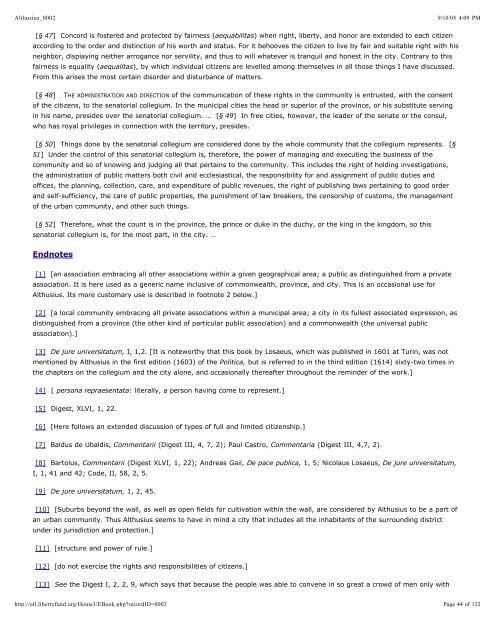Johannes Althusius: Politica - Hubertlerch.com - HubertLerch.com
Johannes Althusius: Politica - Hubertlerch.com - HubertLerch.com
Johannes Althusius: Politica - Hubertlerch.com - HubertLerch.com
Create successful ePaper yourself
Turn your PDF publications into a flip-book with our unique Google optimized e-Paper software.
<strong>Althusius</strong>_0002<br />
9/10/05 4:09 PM<br />
[§ 47] Concord is fostered and protected by fairness ( aequabilitas) when right, liberty, and honor are extended to each citizen<br />
according to the order and distinction of his worth and status. For it behooves the citizen to live by fair and suitable right with his<br />
neighbor, displaying neither arrogance nor servility, and thus to will whatever is tranquil and honest in the city. Contrary to this<br />
fairness is equality ( aequalitas), by which individual citizens are levelled among themselves in all those things I have discussed.<br />
From this arises the most certain disorder and disturbance of matters.<br />
[§ 48] THE ADMINISTRATION AND DIRECTION of the <strong>com</strong>munication of these rights in the <strong>com</strong>munity is entrusted, with the consent<br />
of the citizens, to the senatorial collegium. In the municipal cities the head or superior of the province, or his substitute serving<br />
in his name, presides over the senatorial collegium. … [§ 49] In free cities, however, the leader of the senate or the consul,<br />
who has royal privileges in connection with the territory, presides.<br />
[§ 50 ] Things done by the senatorial collegium are considered done by the whole <strong>com</strong>munity that the collegium represents. [§<br />
51] Under the control of this senatorial collegium is, therefore, the power of managing and executing the business of the<br />
<strong>com</strong>munity and so of knowing and judging all that pertains to the <strong>com</strong>munity. This includes the right of holding investigations,<br />
the administration of public matters both civil and ecclesiastical, the responsibility for and assignment of public duties and<br />
offices, the planning, collection, care, and expenditure of public revenues, the right of publishing laws pertaining to good order<br />
and self-sufficiency, the care of public properties, the punishment of law breakers, the censorship of customs, the management<br />
of the urban <strong>com</strong>munity, and other such things.<br />
[§ 52] Therefore, what the count is in the province, the prince or duke in the duchy, or the king in the kingdom, so this<br />
senatorial collegium is, for the most part, in the city. …<br />
Endnotes<br />
[1]<br />
[an association embracing all other associations within a given geographical area; a public as distinguished from a private<br />
association. It is here used as a generic name inclusive of <strong>com</strong>monwealth, province, and city. This is an occasional use for<br />
<strong>Althusius</strong>. Its more customary use is described in footnote 2 below.]<br />
[2]<br />
[a local <strong>com</strong>munity embracing all private associations within a municipal area; a city in its fullest associated expression, as<br />
distinguished from a province (the other kind of particular public association) and a <strong>com</strong>monwealth (the universal public<br />
association).]<br />
[3] De jure universitatum, I, 1,2. [It is noteworthy that this book by Losaeus, which was published in 1601 at Turin, was not<br />
mentioned by <strong>Althusius</strong> in the first edition (1603) of the <strong>Politica</strong>, but is referred to in the third edition (1614) sixty-two times in<br />
the chapters on the collegium and the city alone, and occasionally thereafter throughout the reminder of the work.]<br />
[4] [ persona repraesentata: literally, a person having <strong>com</strong>e to represent.]<br />
[5]<br />
[6]<br />
Digest, XLVI, 1, 22.<br />
[Here follows an extended discussion of types of full and limited citizenship.]<br />
[7] Baldus de Ubaldis, Commentarii (Digest III, 4, 7, 2); Paul Castro, Commentaria (Digest III, 4,7, 2).<br />
[8] Bartolus, Commentarii (Digest XLVI, 1, 22); Andreas Gail, De pace publica, 1, 5; Nicolaus Losaeus, De jure universitatum,<br />
I, 1, 41 and 42; Code, II, 58, 2, 5.<br />
[9] De jure universitatum, 1, 2, 45.<br />
[10]<br />
[Suburbs beyond the wall, as well as open fields for cultivation within the wall, are considered by <strong>Althusius</strong> to be a part of<br />
an urban <strong>com</strong>munity. Thus <strong>Althusius</strong> seems to have in mind a city that includes all the inhabitants of the surrounding district<br />
under its jurisdiction and protection.]<br />
[11]<br />
[12]<br />
[structure and power of rule.]<br />
[do not exercise the rights and responsibilities of citizens.]<br />
[13] See the Digest I, 2, 2, 9, which says that because the people was able to convene in so great a crowd of men only with<br />
http://oll.libertyfund.org/Home3/EBook.php?recordID=0002<br />
Page 44 of 132







